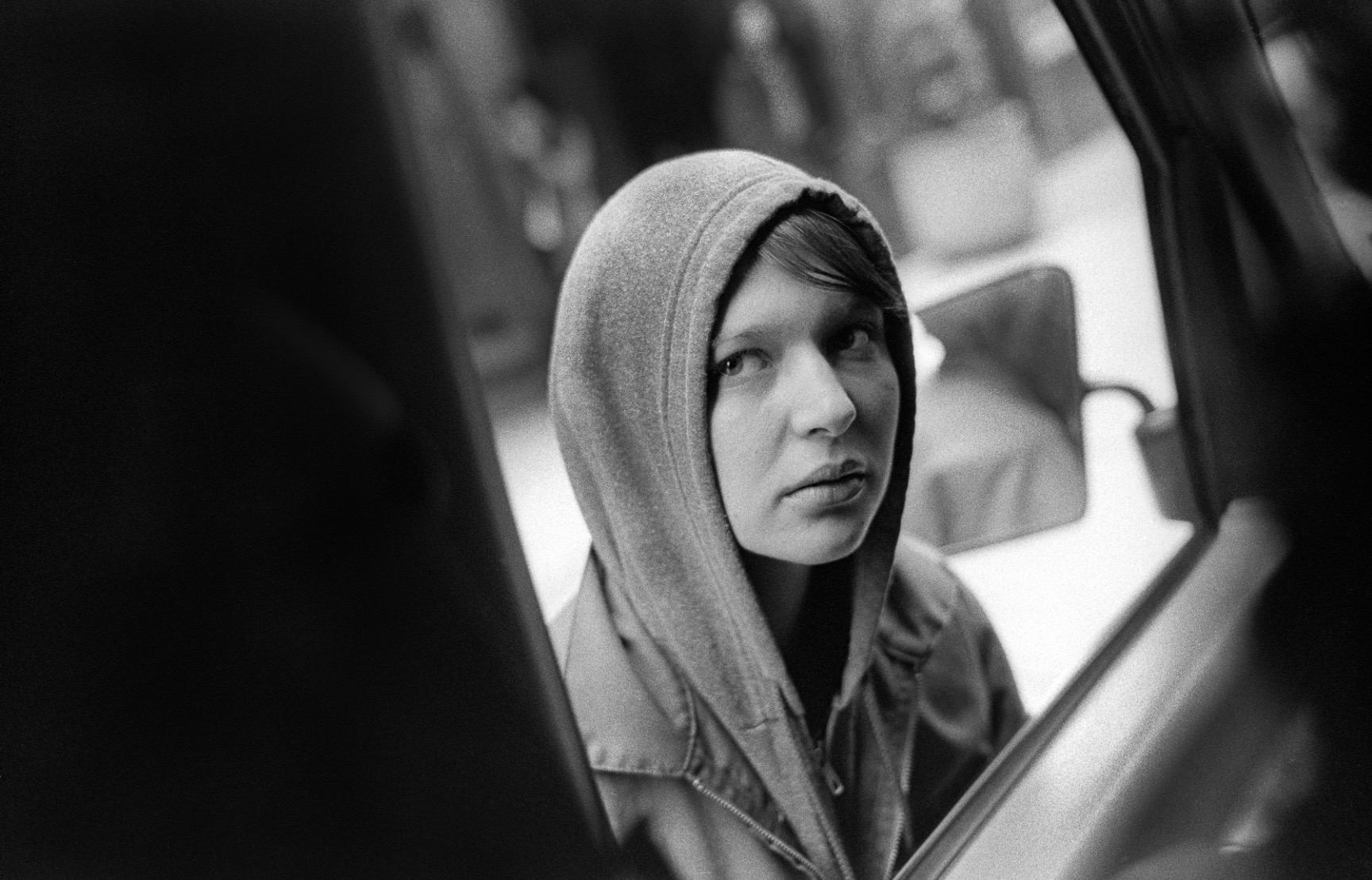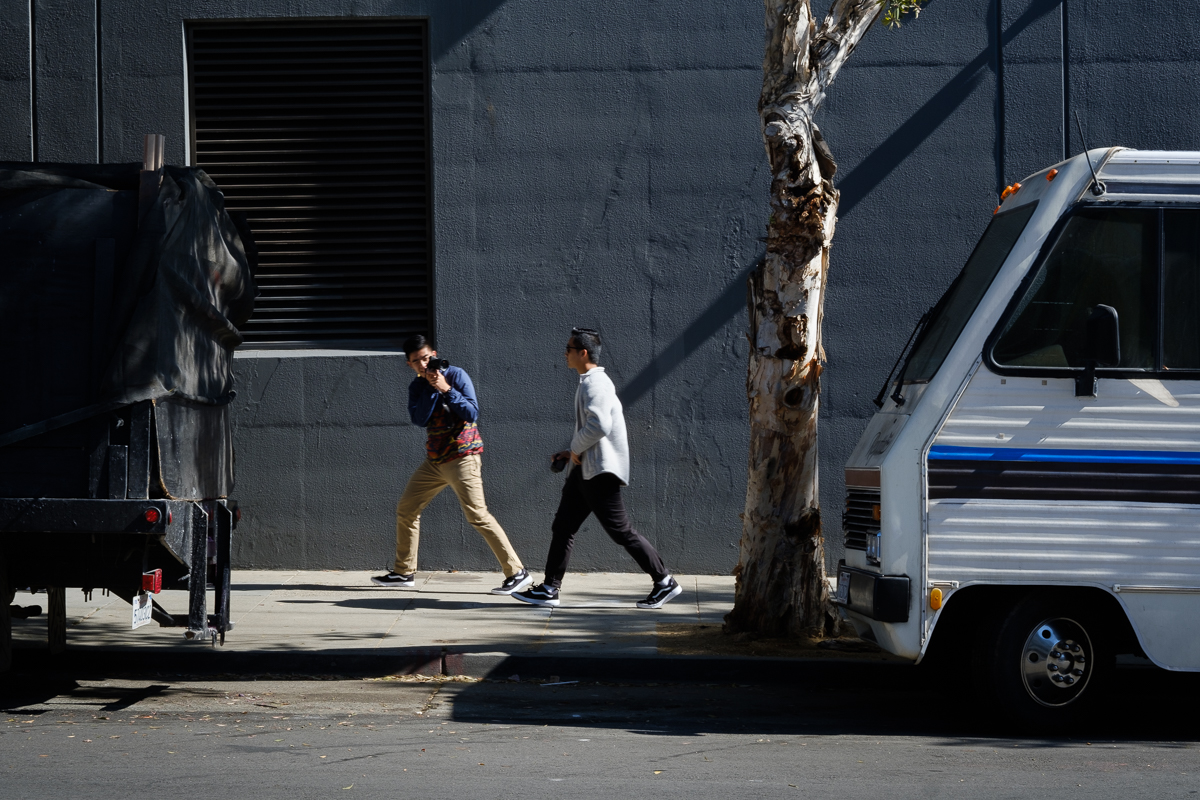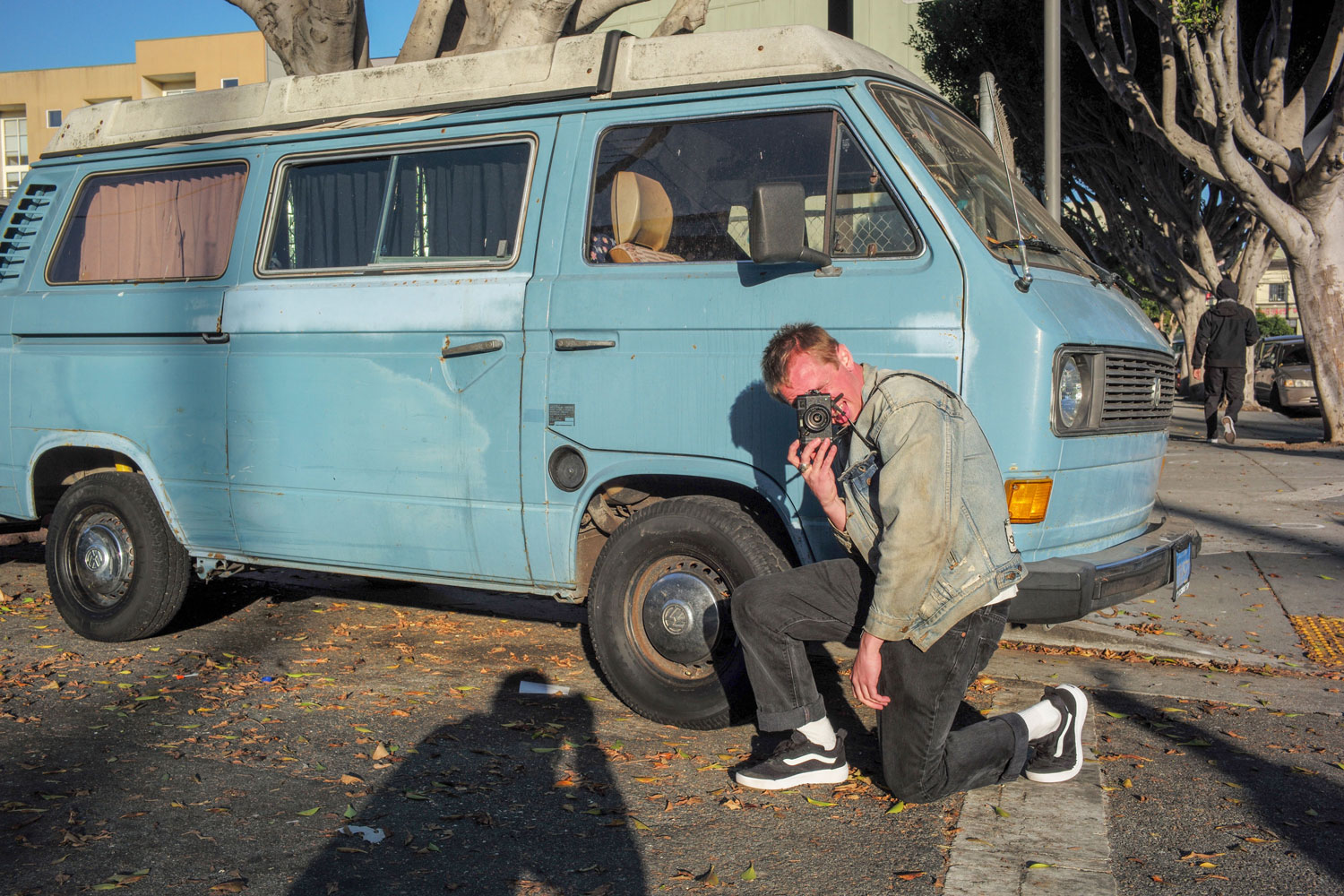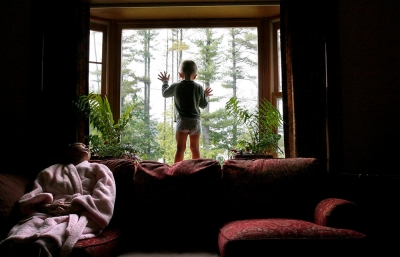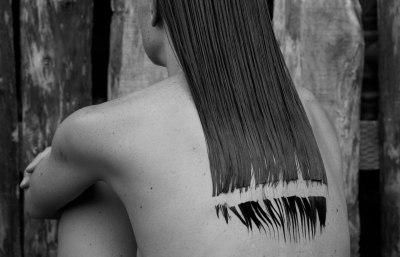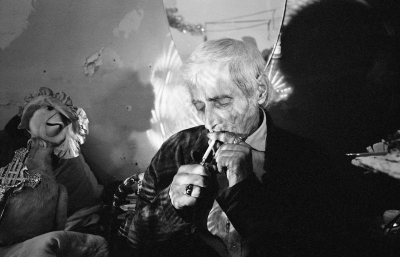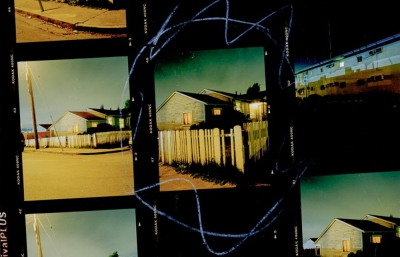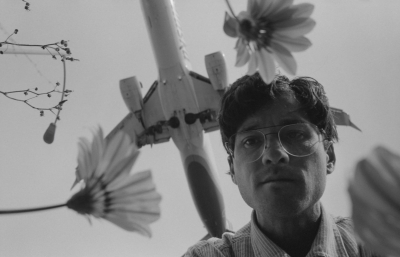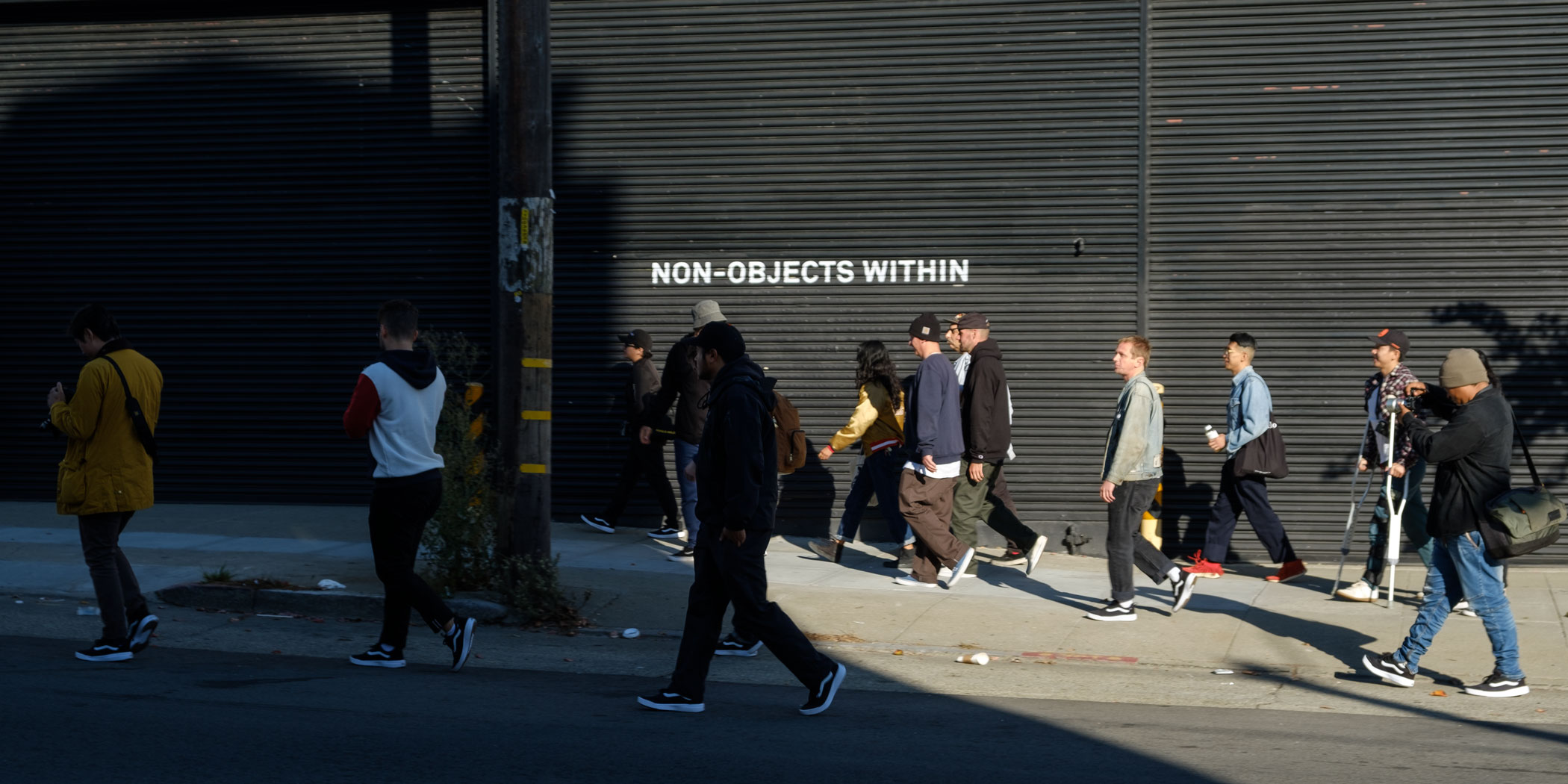
Vision Walk: San Francisco
With Tobin Yelland
We are traveling around the country with VANS VISION WALKS, a series of workshops led by some of our favorite photographers in their home cities. This past weekend we spent the AFTERNOON with Tobin Yelland as he led participants on a walk through the Mission District in San Francisco.
“San Francisco is such a colorful place,” explains Tobin Yelland. “There's the Sisters of Perpetual Indulgence... I'm ten and watching nuns play baseball. Dudes dressed like nuns playing baseball...” Growing up in the 70s and 80s in San Francisco, Yelland was raised in a city and household that embraced creative expression. As a teenager picking up a camera to photograph his friends skateboarding, it was only natural that his talent and interests were supported and encouraged by a growing community of like-minded artists, skaters, filmmakers, and photographers. “Creativity is so contagious,” Yelland tells us. Seeing someone do something different and realizing that “you don’t have to do the same thing, you don’t have to follow this structure, you can do whatever you want,” can be life-changing. Yelland led a Vans Vision Walk around San Francisco’s Mission District last weekend, encouraging everyone to collaborate with one another and sharing what he has learned from over three decades of being a photographer. Read our interview with him and watch a video below.
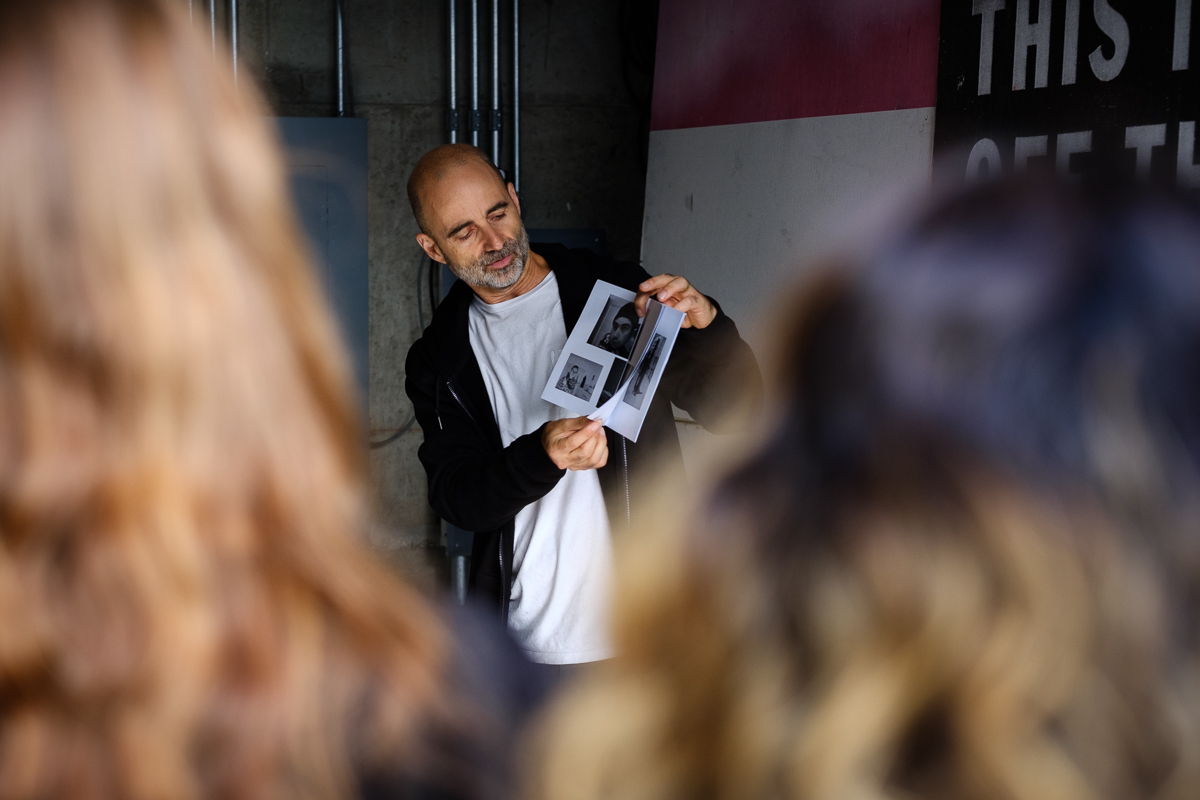
Juxtapoz: You got into photography pretty young, before high school, right?
Tobin Yelland: I got into skateboarding when I was in middle school. The friends that I met were skateboarders, so they were like, "We're going to get you to skateboard. We're going to teach you how to skateboard." So I started skateboarding, and then at the end of middle school I started borrowing my mom and step dad’s cameras more and shooting photos of my friends skating. I was able to get a camera around eighth grade and then took a photography class with Luke Ogden. We both took it the summer of eighth grade. It was so natural to be like, "Alright, I'm going to photograph my friends. That's my subjects." It was fun.
What were the first photographs you remember having a big impact on you as a kid?
The first photographs I remember really liking were skate magazine photos, like Thrasher and Transworld. I also really liked David Bailey because he was this British fashion photographer but he would also photograph music. I also liked Edward Weston a lot. I saw The Daybooks of Edward Weston. He didn't use any lights or retouching, that's what his thing was. It was all just very natural and real, and that was really cool. It was nice to be around all the skate photographers too, like Bryce Kanights, Mofo and Kevin Thatcher.
How important was that community of creativity for you as a photographer?
Well, I grew up in San Francisco and I think it’s similar to New York in the 80s in that it was inexpensive and you could be an artist and you could live there and make art. I got so much out of being around people like Barry McGee and Margaret Killgallen, Chris Johanson, Julien Stranger, Mickey Reyes and so many other friends that were just out having fun that was a great subject matter to photograph. There were a lot of people in the art studios, people that were making a stab at being a real artist on different levels. It was really cool, lots of inspiring people, musicians too. Lots of great music.
Did being around so many different types of art and people doing creative things help make photography feel like a natural path for you?
My parents are artists so I was always around art galleries and art shows and things like that. San Francisco's just such a colorful place. There are the Sisters of Perpetual Indulgence... I'm ten and watching nuns play baseball. Dudes dressed like nuns playing baseball and all kinds of crazy stuff going on. And Mission Street in the seventies, there were lowriders going up and down the street. I'd go there with my babysitter and that was really impactful on me.
"Using a certain camera over and over again, it's a great place to be when you almost don't have to look at it and then it's kinda like your Samurai sword."
So were your parents were pretty supportive of what you were doing.
My mom's an artist. I lived with my mom and she would set me up. I think my first big memory of making my own art and giving it to people, was when she set me up this little card table on Valentine's Day or Christmas or something, and told me, "Do your drawings and make cards." I was drawing Star Wars pictures and I remember selling them for a quarter or something like that. So it kind of got into my head that you can make something, make art, and then sell it.
Were you around lots of interesting artists as a kid too then? Do you think that helped you as a photographer, being comfortable with whoever you are photographing?
I grew up in a home where art was really central, and something that was really cool and accessible. In contrast to some friends that have this funny idea about art, that it's kind of this intangible kind of thing. Like, "I don't know if I'm good at it." In growing up with my mom it was like, yeah, "Just do it. Just do this."
When you first began shooting your friends skating, what made you decide to also shoot the scenes around the action?
I started photographing my friends and I got a fisheye lens because you have to get a fisheye to photograph skateboarding. I remember my photo teacher was like, "It's a bozo lens," haha. So I shot skateboarding and I'd photograph my friends being dorks, I think it's just fun. I think it's just fun to photograph my friends, and I really got into it. I liked documentary photography. I was going to the Museum of Modern Art, my mom had a membership card so I could just go down there and check it out. It made an impression on me as a kid and I really got into books about photography and I liked documentary photographers like W. Eugene Smith and Gordon Parks or any kind of Life magazine photographer. So it was natural for me to just photograph my friends because it's real life that's happening around me. Before that, I thought maybe I wanted to be a fashion photographer, or I thought that skate photography wasn't a real thing.
When was it that you decided that it was a real thing and that you could do photography any way you wanted?
I went to a documentary photography workshop. They had photographers like Pedro Meyer, William Klein, and Larry Clark. I was 17 and being around those people made me realize, "Wow. This is really cool. This is what I want to do." That was the point, where said, “I think I'm gonna focus on documenting."
You talked a little today about your relationship with the person you're photographing, whether you're walking up to them asking if you can take their photo or just taking it without their permission. Do you feel like you have to be good with people to get good photographs?
For me, I think the better you are with people the better your photographs can be. I know there's a lot of people who probably don't ever talk to anyone and they just walk around and they make their street photography and that's cool too. I think what it's about for me is a collaboration between myself and who I'm photographing, and sometimes it's sneaky moments where I might be just photographing in-between moments and there might be a static, set up shot, and then there are others. It's endless, there are endless opportunities to take a picture.
Did you always feel comfortable with that aspect of it, of making your subject feel comfortable?
Oh, no, I didn't always feel like that. Definitely starting out I was super primitive, I didn't know what I was doing, didn't feel really comfortable with it but I liked photography and was endlessly figuring it out, and I'm still figuring it out. It's just peaks and valleys. You get good at something for a little while then there's something new to figure out. And oftentimes, most of the photos I take are just horrible and then there are a few good ones. It takes tons and you're like, " Alright, I got one good one. I'm good." And then sometimes they all suck, and then you have to go back and do more. And sometimes it's really easy, sometimes it's really hard, it's funny.
I think there's a warm-up, you have to warm up and just get it moving. I think with writers it's the same thing, not every word you write is great but it's just doing it on a consistent basis that puts you in that right place to find some magical moments. It's that consistent… going to work.
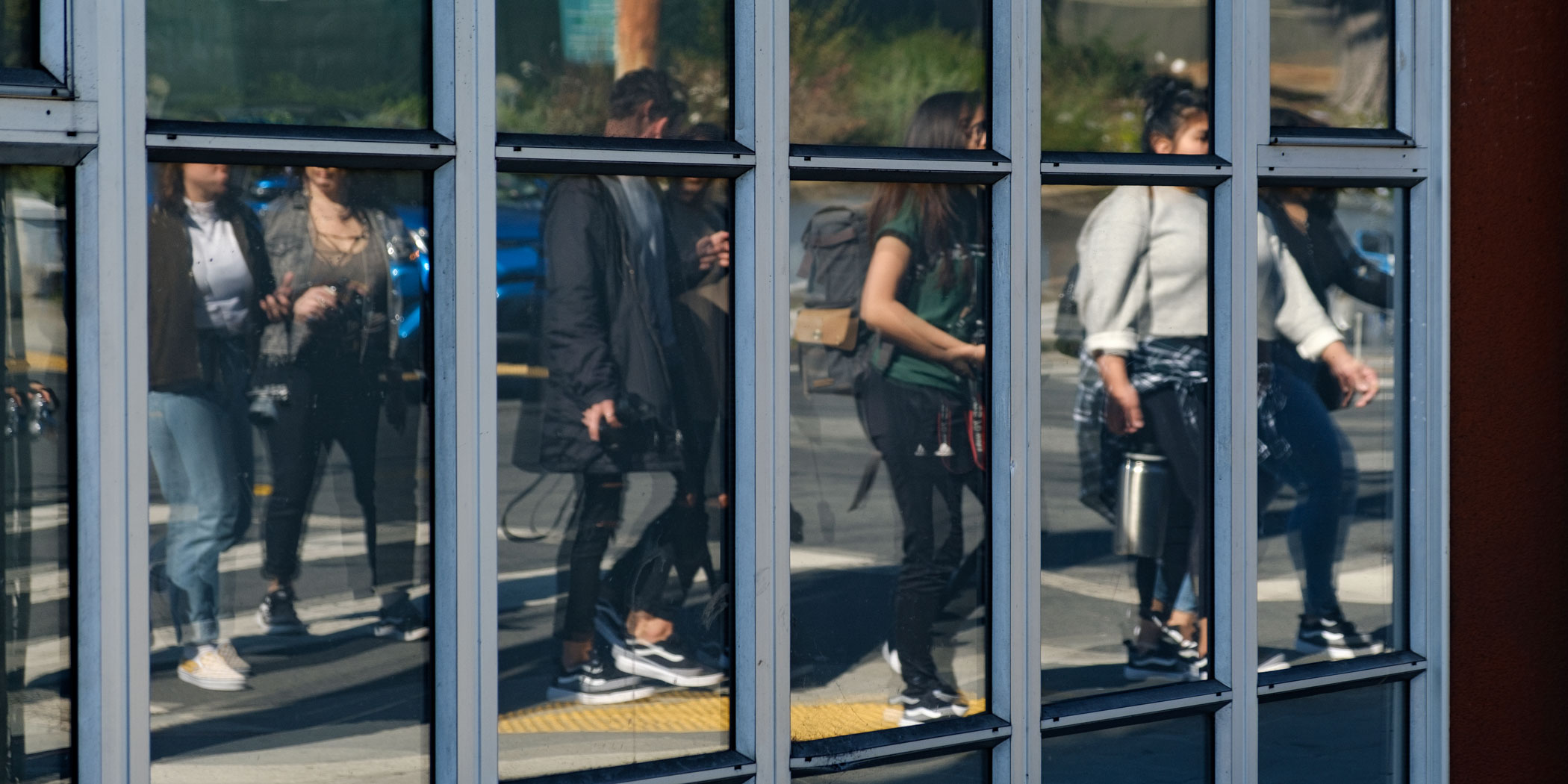
What is most rewarding for you, seeing a photo you captured that you like or taking the photos?
What keeps me wanting to do photography is photographing different things, different subject matter and also figuring out different lighting, different ways to photograph someone, there are endless things. Everywhere you look there's something to photograph, so the thing that keeps me interested is just trying to find something that's exciting. There's always something that's right around the corner that would make good photographs.
You mentioned you're still learning stuff. What were the kind of things you had to learn early on versus the kind of things you're learning now that you're older and been doing it for so long?
I think, for one thing, learning the camera. I've been learning bass guitar over the last year now. Starting out you really have to look at it when you’re playing. And then after you play it again and again, you can almost not look at it, and eventually, you can feel where the places are you're supposed to hit and the timing. Using a certain camera over and over again, it's a great place to be when you almost don't have to look at it and then it's kinda like your Samurai sword. You almost don't even have to look down, you just pick it up and use it. When I was a kid I would miss tons of photos, and I still miss lots of photos but just knowing the camera there are so many more opportunities to take advantage of.
There are so many types of photography you can't know them all, you can't know everything, I mean, some people do probably. A couple months ago I had a studio shoot and I don't do many studio shoots so I called a friend and he gave me a diagram for lighting. The situation is totally different but the interaction with the subject, you still have to make that person feel comfortable, it's still a collaboration. They have to like what you're doing to be able to really be there for the photographs and you get what the person gives you, whatever that is. I think it's like most things, it's more important to be personable for me than the technical aspect of it. Although it's nice to have a technically excellent photograph, it's not the most important thing. It's more important just to capture a cool moment.
Has photography changed you on a more personal level, outside of a career or lifestyle?
The aspect of having to put yourself out there is one of the reasons why I like photography because I was definitely really shy growing up. It's funny, at the very beginning like being at a skateboard session. If you're shooting vert or there's a vert session going on, and you want to get a shot from the flat bottom of someone doing an air over you or something, you go down in the bottom of the pool, and someone does a trick over you. You're part of this choreography of fun in a pool, or a vert ramp, or a skating street, and you have to insert yourself into the mix. Or shooting a portrait of someone especially you don't know, I think that really makes you be more outgoing. It's fun and it gets you out of your shell.
When you were taking photos of your friends, many of the skaters and artists who were very well known or would go on to be important figures in skateboarding and art, were you thinking about what the photos might mean in 20, 40, or 60 years?
I think it's only looking back. Day to day, making films or photographing it's all about what's happening now and trying to work out all those problems. It's only when you have to look through a lot of images or video that you're like, "Oh my God, that's so long ago." It's really funny, I'll see a photograph of a car and I won't know when the photograph was taken but I'll know I was a certain age when I had that car, so then I'll figure out what the date was. It's these kinds of physical pieces, that you can piece together a past.
Did you ever have doubts about photography, times when you felt maybe you should do something else?
No. I remember as a teenager too, it wasn't all exciting for me to photograph and sometimes I would put the camera down and not pick it up for a while. I think I was 18. It was a time to go to college or get a real job and it's all so intimidating, daunting. I think I was a delivery driver for a company that brought fruits and vegetables to restaurants, and I was not sure if I wanted to be a photographer and not sure what I wanted to do, but I think it all works out. I mean, no situation is ever perfect. I think I was alway, singularly was focused on doing photography and maybe I'll take a job that's not entirely perfect, it's still a job using a camera. So that's great.
When did you decide, “Okay, this is something I’m going to do, something I might be able to make a living doing?”
Early on I got a Venture ad. Fausto Vitello picked a photo of mine or some photos for a Venture ad and I was hyped. I was 16 and getting a photo published and getting a little bit of money, I was like, "Wait, I can pay rent with this?" It was a big moment of, "Okay, I wanna do that."
You helped make the Antihero "Fucktards" video. Spending one day with you, you seem like such a calm mellow person. I don't know if you were like that as a kid, but what was it like documenting that group of people?
I started to be a photographer in the early nineties and I had a lot of friends that I'd gone to high school with that were starting skateboarding companies and everyone's into art and skateboarding. When we got opportunities to make a video, it was only natural to do something weird. When you get the chance to do whatever you want you gotta do whatever you want. So that was why "Fucktards" was so unique. Julien Stranger was the creative voice behind it and he tends to do things that are really different and wanting to not be like everyone else. The nineties were a pretty fun time to skate street, and skating the streets was exploding. Skateboarding was becoming something different. It was a fun time. Creativity is so contagious. You see someone do something different and really cool and you're like, "Whoa," and you get so excited. "Wait, so you don't have to do the same thing, you don't have to follow this structure, you can do whatever you want?”
Did you always shoot photos in tandem with video? How did you balance the two?
I started with photography and everyone was always shooting video too so it's so natural to be like, "get a video clip of me, I'm gonna do this on video too." There was a time where photos were still more important than video and then video was more important than still photos. I always found it hard to do both. It was a lot easier or better just to shoot video one day, and shoot stills another day. I don't know, it's all visuals.
What do you think it is that makes one photographer’s photos of the same scene, same tricks, stand out from others?
I had so many people around that inspired me to do different things but I think for me trying to make it a little different made it interesting and made it a fun thing to do. No matter what, there's gonna be some repetition. You run into like, “That's the same photo,” or “That's not as exciting as it could be,” but there's always these breakthrough moments that you're trying to find something new. As far as skate photos go, you might get this cool reflection off a building on a spot and you're like, " Oh my God, this is perfect. How did this happen at this moment?" And whoever you're photographing does a cool trick and it was the right moment for them, and then it's the right moment for you and the light and then everything lines up and that's really cool.
Having the right light, composition, and some chance.
Yeah, there is a lot of chance involved. There are moments where you're like, " Whoa, I'm gonna try the flash down here, or up there." I liked how Lance Dawes and Gabe Morford would always work as a team, they'd be at a skate contest and maybe Lance would be taking a photo and then Gabe would have a slave, but a big flash or something on the ramp and then they'd take some really cool photos. Trying things differently.

